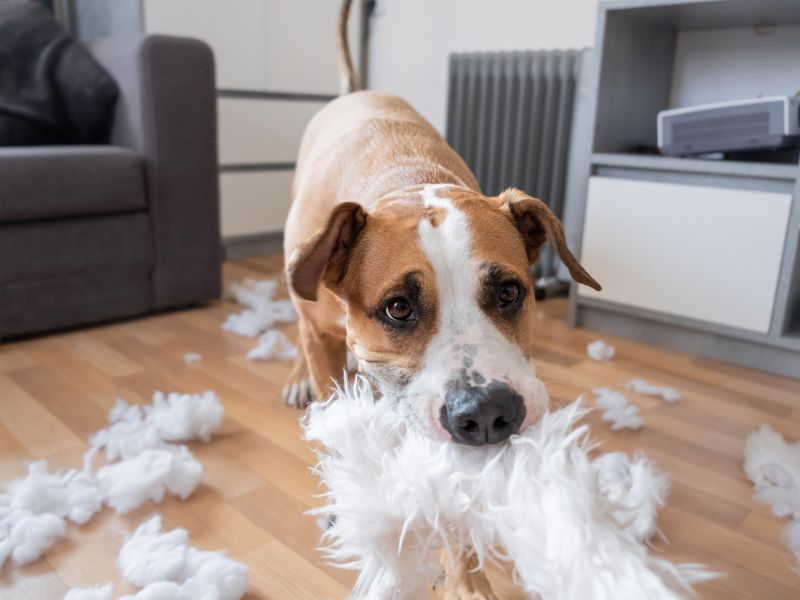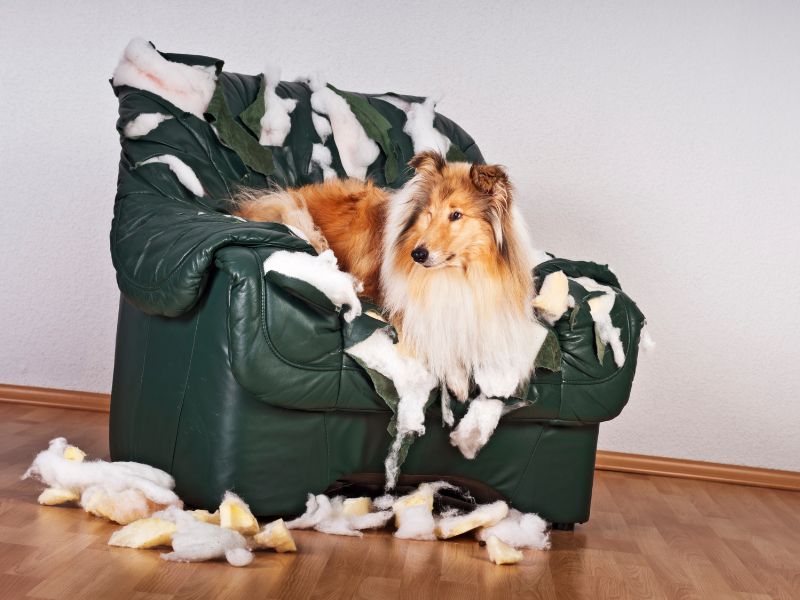Dogs are often considered to be man’s best friend, providing us with unconditional love, loyalty, and companionship. However, even the most well-behaved dogs can sometimes exhibit destructive and problematic behavior. From chewing on furniture, to excessive barking, and even aggression. These behaviors can leave dog owners feeling frustrated, helpless, and even concerned for their own safety. In this article, we’ll take a deep dive into the triggers of destructive behavior in dogs, exploring everything from boredom and anxiety to medical conditions and environmental factors. By understanding the root causes of these behaviors, we can help our furry friends lead happier, healthier lives while also creating a more harmonious home environment for both them, and their humans. So, if you’re a dog owner struggling to understand why your pup is acting out, read on for some valuable insights and practical tips.
Understanding Boredom as a Trigger
One of the most common triggers for destructive behavior in dogs is boredom. When dogs are left alone for extended periods of time without stimulation or interaction, they can become restless, anxious, and even depressed. This can lead to destructive behaviors such as chewing, digging, and excessive barking.
It’s important to understand that dogs are social animals and need mental and physical stimulation to remain happy and healthy. They can become bored and restless, when left alone for a time, which often can lead to destructive behavior.
To prevent boredom in dogs, it’s important to provide them with activities and stimulation while you’re away. This can include puzzle toys, treat balls, and interactive toys that dispense treats or make noise. You can also leave the radio or TV on to provide some background noise and make them feel less alone.
It’s also important to make sure your dog gets enough exercise and socialization. A tired dog is a happy dog, and regular exercise can help prevent destructive behavior by reducing their energy levels and providing an outlet for their natural instincts.

Understanding Anxiety as a Trigger
Anxiety is another common trigger for destructive behavior in dogs. Anxiety can be caused by a variety of factors, including separation anxiety, fear, and phobias. Dogs with anxiety may exhibit destructive behavior such as chewing, digging, and excessive barking as a way to cope with their feelings of stress and anxiety.
Common signs of anxiety in dogs include excessive panting, shaking, pacing, and drooling. They may also exhibit destructive behaviors when left alone or in unfamiliar situations.
To manage anxiety in dogs, it’s important to identify the root cause of their anxiety and address it directly. This may involve desensitization training, which involves gradually exposing your dog to the source of their anxiety in a controlled and safe environment.
It’s also important to create a safe and comfortable environment for your dog. This can include providing them with a safe space, such as a crate or a designated room, where they can retreat when they feel anxious. You can also use calming aids such as pheromone sprays or supplements to help reduce their anxiety levels.
Common Signs of Boredom and Anxiety in Dogs
It is vital to be able to recognize the signs of boredom and anxiety in dogs so that you can address these issues before they lead to destructive behavior.
Common signs of boredom in dogs include excessive barking, chewing, digging, and destructive behavior. They may also appear restless and lack interest in their surroundings.
Common signs of anxiety in dogs include excessive panting, shaking, pacing, and drooling. They may also exhibit destructive behavior when left alone or in unfamiliar situations.
Training Techniques to Address Destructive Behavior
Training can be an effective way to address destructive behavior in dogs. Positive reinforcement training, which involves rewarding your dog for good behavior, can be particularly effective.
It’s important to never punish your dog for destructive behavior, as this can lead to fear and anxiety. Instead, focus on rewarding good behavior and redirecting their attention when they exhibit destructive behavior.
You can also use desensitization training to address anxiety and fear-based behaviors. This involves gradually exposing your dog to the source of their anxiety in a controlled and safe environment.

See Also: My Fussy Dog Won’t Eat – What to Do?
And: How Do I Stop My Dog Jumping Up On People?
Providing Mental Stimulation for Dogs
Providing mental stimulation for your dog can help prevent boredom and reduce the risk of destructive behavior. This can include puzzle toys, treat balls, and interactive toys that dispense treats or make noise.
You can also provide your dog with a variety of toys and activities to keep them engaged and stimulated. This can include games such as hide-and-seek or teaching them new tricks and commands.
The Importance of Exercise for Preventing Destructive Behavior
Exercise is essential for preventing destructive behavior in dogs. Regular exercise can help reduce their energy levels and provide an outlet for their natural instincts.
It’s crucial to provide your dog with enough exercise to meet their needs. This can vary depending on their age, breed, and size. A good rule of thumb is to provide at least 30 minutes of moderate exercise per day, such as a brisk walk or a game of fetch.
Conclusion and Final Thoughts
Destructive behavior in dogs can be frustrating and concerning for dog owners. However, by understanding the root causes of these behaviors, we can take steps to prevent them and provide our furry friends with the stimulation and care they need.
If you’re struggling with destructive behavior in your dog, it’s important to address the issue promptly and seek help if needed. With patience, consistency, and positive reinforcement, you can help your dog overcome their destructive behavior and lead a happier, healthier life.

